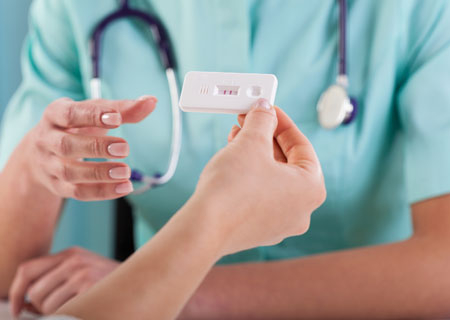India saw a steep rise in its COVID-19 cases in the past two weeks. If you’re pregnant, you’re understandably worried. Sure, you can expect some changes in your usual prenatal care as medical professionals may offer telehealth visits, or make adjustments in their clinics to be compliant with social distancing rules. But could pregnancy put you at a higher risk of contracting COVID-19? Can you pass the infection to your baby? Here’s what doctors and researchers know so far.
Could You Be at A Greater Risk of Coronavirus Due to Pregnancy?
It is true that you naturally have a decreased immunity during pregnancy. However, you are not more likely to contract coronavirus just because you’re pregnant. That said, you could be more at risk of exposure to the virus because of the prenatal visits. But if you do catch the infection, you may suffer more severe symptoms than women who are not pregnant.
Can You Pass the Virus to Your Foetus During Pregnancy?
A study published in the journal Lancet, suggested that pregnant women do not pass the virus to their babies (however, being a novel virus, long term studies are required). However, there are case reports of COVID-19 causing preterm delivery, and intrauterine deaths.Researchers found no evidence of the virus in samples of amniotic fluid or umbilical cord (amniotic fluid serves as a protective liquid for the growing foetus and umbilical cord is a conduit between the developing embryo and the placenta). If you are wondering what keeps the baby safe, it is the placenta that acts as a barrier to the viruses and bacteria.
Can You Breastfeed Your Baby If You Tested Positive for COVID-19?
You should not breastfeed your baby if you are infected with the novel coronavirus. While the virus cannot transmit through breast milk, you could put your baby at risk of infection through respiratory droplets while breastfeeding. Breastfeeding a baby should be a joint decision made by a pregnant woman and their provider. Many factors like the severity of the symptoms, when was the baby born (preterm vs normal) and the duration of the infection play a part. COVID positive patients are currently allowed breastfeed as it promotes maternal and foetal bonding, as well as the immunity of the baby. However, mothers are recommended to practice hand hygiene and wear masks while breastfeeding. Mothers may also express milk for their infants or pump if they’d like to breastfeed that way.
What Precautions Should You Take to Avoid Transmitting the Virus to Your Infant?
If you are tested positive with COVID-19, you must wash your hands before touching the infant and wear a protective face mask while breastfeeding. Alternatively, you can release breastmilk with a manual or electric breast pump and have someone who is well, to feed the milk to the baby.
What Restrictions Can You Expect at The Hospital?
The Centre of Disease Control and Prevention recommends gynaecologists to offer virtual appointments as much as possible due to the potential threat of the disease. So, use Veera to see your doctor through a call. Plus, hospitals are now considering restricting the number of people in the maternity ward, therefore check with the hospital or birth center where you plan to deliver what their latest policy is. It may be that your husband or partner cannot join you, but these are unprecedented times.As of now, the maternity wards around the nation haven’t seen a shortage of staff, medical supplies or beds. So, you can feel reassured that the entire medical system all over the country is geared towards keeping every single patient as healthy as possible!
Would it Be Safer to Have a Home Birth?
A lot of women are trying to avoid hospital visits because they are scared of the virus. But home birth can be dangerous with complications that can be life-threatening. Therefore, you must get the delivery done in a hospital or birthing centre with trained professionals. Reach out to your hospital or birthing centre to find out what measures they have in place to you keep you and your baby safe.
I am Being Abused at Home. How Can I Get Help?
Many studies have showed that rates of domestic violence increase during pregnancy, and with social distancing rules in place, it can worsen levels of abuse. A study of 1500 healthy, pregnant women in Delhi reported a nearly 30% prevalence of domestic abuse. If you are experiencing abuse, please seek help from the helpline numbers and NGOs (see our article on COVID helpline numbers).
I want to get pregnant. Should I wait because of COVID-19?
The decision to get pregnant is a personal choice. You should decide based on your overall health, the potential risks of coronavirus and other personal factors. The effect of the virus on pregnant women is still being studied by scientists and researchers. Reports suggest, however, that pregnant women may have more severe symptoms than the general population. Patients with other conditions, such as lung or heart disease, or diabetes mellitus, have a high risk of severe illness from the virus.
Learn More with Veera Health
Scared of stepping out of the house? Looking to speak to top-rated doctors and experts from the comfort of your home? Consult Veera’s experts online and get the care your deserve!
Reviewed by: Dr. Shailly Prasad, Resident Physician, Obstetrics & Gynecology
Disclaimer: Content on Veera is provided for informational purposes only and is not intended as medical advice, or as a substitute for medical advice given by a physician
References :CDC (Center for Disease Control)https://www.acog.org/patient-resources/faqs/pregnancy/coronavirus-pregnancy-and-breastfeedinghttps://www.ncbi.nlm.nih.gov/pubmed/31803665


















